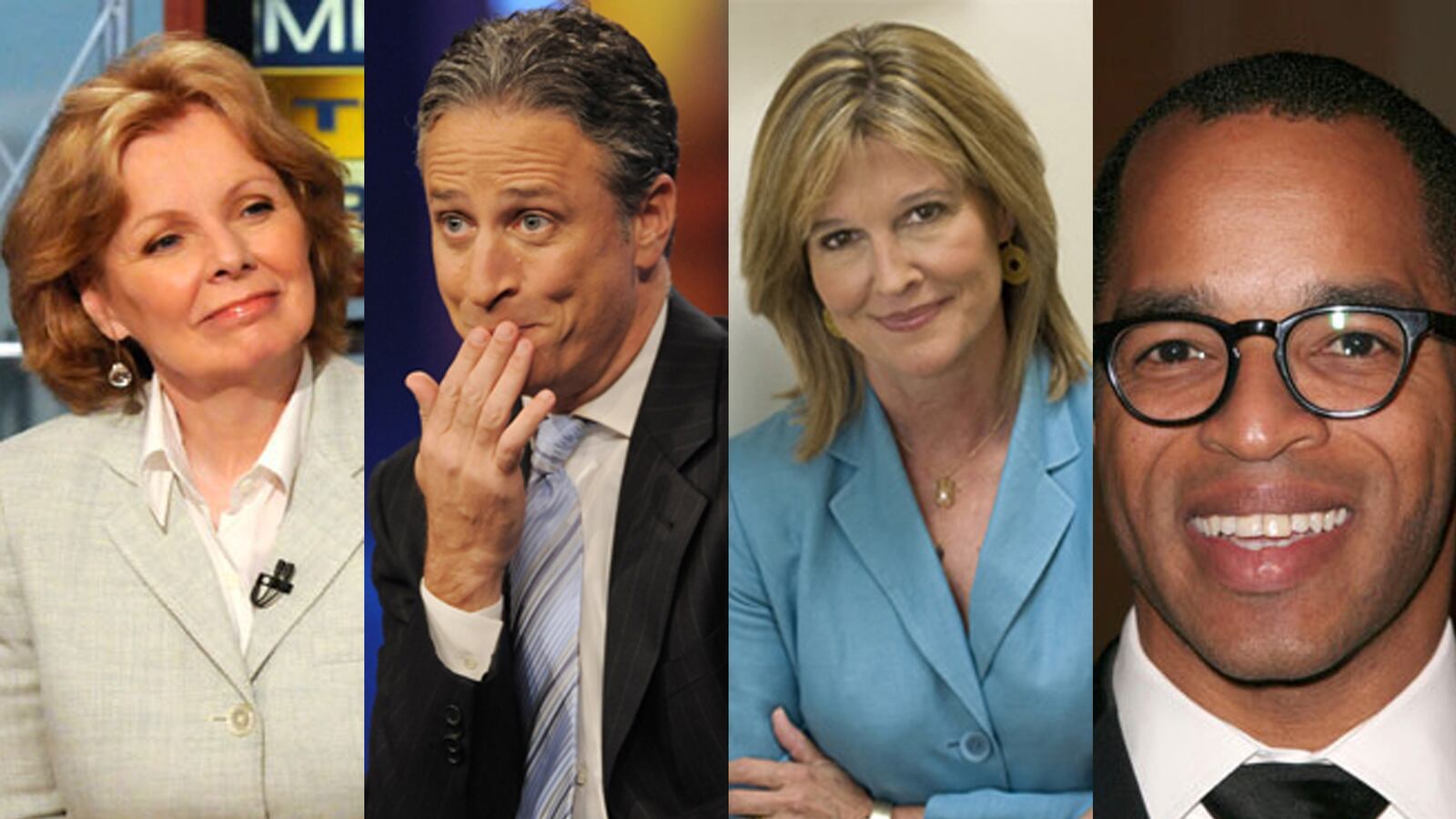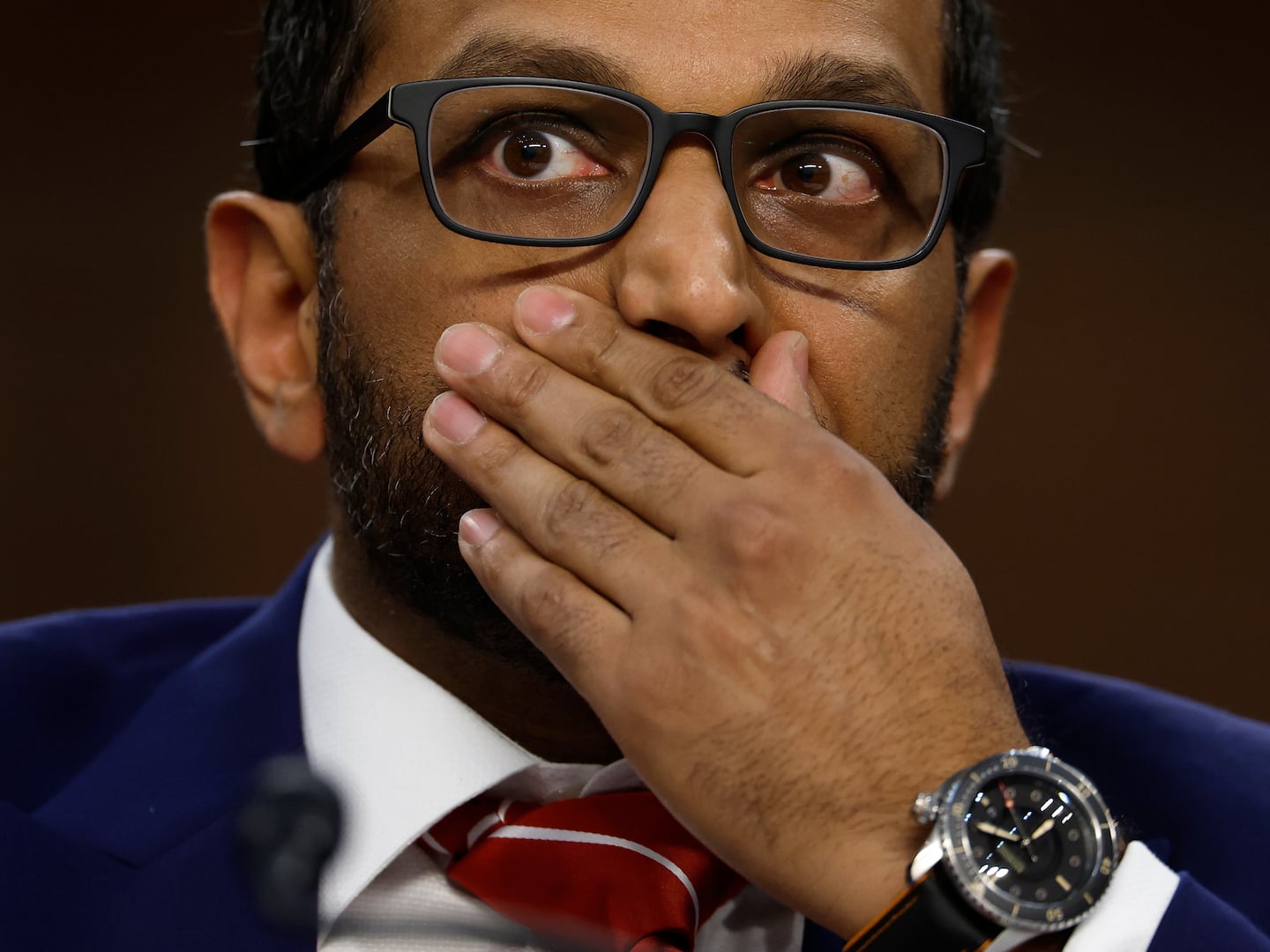
Kathleen Parker is published in more newspapers than any other American columnist—and she recently declared her independence in a powerful column titled, appropriately, “Declaration of Independence.”
Viciously attacked from the far right after she dared to question Sarah Palin’s selection in '08, Parker has long been a smart, funny, skeptical voice from Main Street America. Like most Americans, she doesn’t appreciate being shoved into an ideological straitjacket—and she’s emblematic of the vast vital center of American life, who distrust the arrogance and intolerance of absolutists. Reason requires an independent perspective—and it is a message aided by a resilient sense of humor.

Brooks defines the dimensions of vital center each week, angering professional partisans by refusing to toe either party line in a bid for true intellectual consistency. He argues for the endurance of the politically homeless Hamilton-Lincoln-Teddy Roosevelt tradition of limited but activist government that encourages individual entrepreneurialism. A onetime National Review columnist, Brooks has insisted on giving President Obama a fair but not uncritical assessment, dubbing him a “center-left pragmatic reformer.”
From his high-profile perch, Brooks has been writing about the rise of independent voters, the possibility of a third party emerging from the center, and the possibility of a “saner, updated version of Ross Perot” running for president. “He’ll point out that Washingtonians, all of them, breed selfishness. Republicans refuse to accept tax increases. Democrats reject spending cuts. They’ve put the country on a highway to a fiscal crisis, and there are no exit ramps.”
Alex Wong / Getty Images
His nationally syndicated radio show now begins with the radical centrist theme song from Reservoir Dogs—“ Clowns on the left of me; Jokers to the right; here I am, stuck in the middle with you.” The longtime Republican endorsed Obama in the ’08 election and more recently declared his independence from both parties in a high-profile column written his hometown Philly Inquirer. In it he wrote:
“I'm not sure if I left the Republican Party or the party left me. All I know is that I no longer feel comfortable. The national GOP is a party of exclusion and litmus tests, dominated on social issues by the religious right, with zero discernible outreach by the national party to anyone who doesn't fit neatly within its parameters… Which is not to say I feel comfortable in the Democratic Party, either… All of which leaves me in a partisan no man's land, albeit surrounded by many others, especially my neighbors. By quitting the GOP, I have actually joined the largest group of American voters”— independents.

The “Center” in NPR’s Left, Right and Center, Matt Miller has made himself into a one man centrist think tank. The L.A.-based former Clinton staffer brings the policy substance to the centrist movement in books like The 2% Solution: Fixing America’s Problems in Ways Liberals and Conservatives Can Love and The Tyranny of Dead Ideas. He’s an advocate of using conservative means (like tax credits and school vouchers) to achieve liberal goals—while creating a smaller, smarter government.

The founder of FrumForum.com is a columnist and former George W. Bush speechwriter committed to forming an intellectual home for centrist Republicans who have been subject to an onslaught of RINO-hunting inside the GOP. One of the smartest people in politics on either side of the aisle, Frum is a committed conservative but a principled patriot first. He has been willing to take on tough but often thankless fights against the far right as well as the far left. He is trying to look out for the long-term interests of The Party of Lincoln. His principled independence—and intellectual honesty—just got him fired from conservative think tank AEI.
One year ago, after questioning the wisdom of Rush Limbaugh’s “I hope he fails” ill-wish toward President Obama, Frum was subjected to an avalanche of emails from the extremes. “Most of these emails say some version of the same thing: If you don’t agree with Rush, quit calling yourself a conservative and get out of the Republican Party,” he wrote in a Newsweek cover story. “There’s the perfect culmination of the outlook Rush Limbaugh has taught his fans and followers: We want to transform the party of Lincoln, Eisenhower, and Reagan into a party of unanimous dittoheads—and we don’t care how much the party has to shrink to do it. That’s not the language of politics. It’s the language of a cult.”
Amanda Edwards / Getty Images
Author of the bestselling “ The Trouble with Islam Today: A Muslim’s Call for Reform in Her Faith” and creator of the PBS documentary Faith Without Fear, Irshad Manji is director of the Moral Courage Project at New York University, which defines itself as “ a global leadership program that challenges conformity on the left and the right.” Manji has been called “Osama bin Laden’s worst nightmare” because she embodies a powerful challenge to the radical Islamic orthodoxy—she is a force not just for reform but reformation—and a symbol of the larger clash between freedom and fundamentalism around the world.
“The independent thinker doesn’t belong to a camp,” Manji has written. “She belongs to her conscience.”
John McConnico / AP Photo
The Daily Show host is considered a liberal by conservatives because they bear the brunt of his satirical attacks—but they ignore his record as an equal opportunity offender. His real targets are extremism and ignorance, and he’s taken on Keith Olbermann and Moveon.org as well as Glenn Beck and the Tea Party protesters.
At a time when the spin cycle can be suffocating, satire is best way to cut through the bullshit—and Stewart’s resistance to talking-point versions of reality not only earn him his place on this list, it has earned him the title of “the most trusted name in news” from a Time magazine online poll.
AP Photo
Scarborough is a consistent small-government conservative who is committed to civility and impatient with hyperpartisanship, whether it comes from the right or the left. He is a rare honest broker at a time when cable news is consumed by opinion anchors—and even more valuable to the national dialogue because he is one of the few conservative voices who has had the cojones to stand up to the extremes on his own side of the aisle.
Mark Wilson / Getty Images
This stubborn individualist's path has been forged from the perspective of a Tory conservative forced to confront the collectivism behind a strain of social conservatism in the USA because he is gay. It’s led him to develop a libertarian conservatism that is consistent when it comes to advancing the idea of individual freedom. Partisan labels don’t neatly fit a man who endorsed both Ron Paul and Barack Obama for their respective party nominations in 2008, but Andrew Sullivan’s award-winning blog is a destination for people declaring their independence from political orthodoxy. As he wrote in a seminal post titled “ Leaving the Right”: “There has to come a point at which a movement or party so abandons core principles or degenerates into such a rhetorical septic system that you have to take a stand. It seems to me that now is a critical time for more people whose principles lie broadly on the center-right to do so—against the conservative degeneracy in front of us. Those who have taken such a stand—to one degree or other—demand respect.”
Andrew H. Walker / Getty Images
The author of 2007’s The Second Civil War: How Extreme Partisanship Has Paralyzed Washington and Polarized America was ahead of his time—things have gotten improbably worse. But his diagnosis of the divide-to-conquer impulses inciting each side to increasing extremes remains right on.
As political director of Atlantic Media, he’s brought his search for sober civility to the National Journal and other affiliated outfits. He was among the first to write convincingly of the Internet’s ability to organize the politically homeless independent voters in the radical center, writing “the two parties are pursuing strategies that create an opening in the center of the electorate, even as the Internet makes it easier for a new competitor to fill it.”
Alex Wong / Getty Images
Mark McKinnon is evidence that principled centrism is not an oxymoron. The political consultant piloted John McCain’s 2008 primary campaign to victory while turning Karl Rove’s play-to-the-base politics on its head. But he announced in advance that if Barack Obama won the Democratic nomination, he would ride off into the sunset rather than participate in the negative attacks he knew would be required. This is unheard of in the world of modern politics, where partisanship trumps principle as a matter of course. McKinnon has brought this big-picture focus to his columns on The Daily Beast, always steering toward the center with casual wit, clarity, and conviction.

The man speaks about politics with the authority of someone who’s lived it at the highest levels—and on both sides of the aisle. An example of putting patriotism over partisanship, Gergen served variously in the Nixon, Reagan, and Clinton White Houses. His steady voice offers calming context to overheated political debates. He understands that politics is history in the present tense.
David Zalubowski / AP Photo
The former congressman has emerged as a cable news spokesman for a rising generation that rejects the outdated orthodoxies of the far right and far left, a recognition that old divisions are still driving partisan politics long after they have outlived their usefulness. His flirtation with the N.Y. Senate seat held by Kirsten Gillibrand ended abruptly as he confronted special interests in the Democratic Party, but an op-ed declaring his intention not to run included a defiant tone, a sign of fights yet to come: “I am a Democrat. But I am an independent Democrat. I am not going to stop speaking out on behalf of policies that I think are right—regardless of ideology, party or political expediency.”
AP Photo
The blogger behind the Web site LittleGreenFootballs.com found himself at the frontlines of a national debate this year over the growing influence of the lunatic fringe over the Republican Party. The anti-jihadist found himself attacked by the far right with even greater fervor than the Islamist supremacists who attacked him previously. He has given as good as he has got, providing a vital news service for those monitoring the increased influence of the extremes in American politics. His post “ Why I Parted Ways With the Right” should be required reading for all centrists and independents at a time when the fringe is blurring with the base.

The onetime Clinton pollster, alongside Mark Penn, has ventured out on his own and reinvented himself as an expert on the data behind the burgeoning independent voter movement, offered in columns and commentaries—and especially in his excellent and instructive book Declaring Independence: The Beginning of the End of the Two-Party System.
Don Pollard
A beacon of civility and grace on the center-right, Peggy Noonan’s columns hearken America back to the better angels of our nature. She warns against the temptations of ideological arrogance and legislative over-reach, balancing a political faith in Main Street conservatism with a recognition that evil exists in the world and must be confronted.
She has been a principled critic of the Obama administration while retaining her compassion and consistently warning against the dangers of pumping up hate in the service of hyperpartisanship. “It is a daily agitating barrage that coarsens and inflames. It tears the national fabric. But it could wind up doing worse than that…This isn't debate, it's more like incitement. And it comes from both right and left.”
William B. Plowman / AP Photo
Twice a week, Tom Friedman offers public seminars on what a centrist foreign policy might look like in the pages of The New York Times. Like all good centrists, conservatives think he’s liberal while liberals think he’s conservative. He’s a believer in making change our ally and not our enemy, an advocate for embracing globalization while warning about its discontents. He is tough on terrorists and petro-dictators alike—but his most steady aim has been on the tendency of extremists and absolutists to hijack both domestic and geo-political debates with far reaching consequences.
In a recent column he wrote: “I want a Tea Party of the radical center… we need political innovation that takes America’s disempowered radical center and enables it to act in proportion to its true size, unconstrained by the two parties, interest groups, and orthodoxies that have tied our politics in knots.”
Alex Wong / Getty Images
The dean of the D.C. columnists, Pulitzer Prize-winning David Broder has been described as “relentlessly centrist”—a perspective he has held throughout the decades-long polarization of the two parties. His 1971 book, The Party’s Over: The Failure of Politics in America, started marking the disenfranchisement of independent voters long before most of the press corps would take notice.
Brendan Smialowski / AP Photo
Before he became known as the anonymous author of the Clinton-era political classic Primary Colors—but after he authored a great biography of Woody Guthrie—this baby boomer Time magazine columnist was plowing the centrist ground with predictions of the continued influence of independent voters in the wake of Ross Perot. Klein’s 1995 article “Stalking the Radical Middle” was a marker in the movement, laying out a list of demands that remain unmet today: Clean up the system; balance the budget and restore civility.
Alex Wong / Getty Images
Just as Reagan once said that he didn’t leave the Democratic Party, the Democratic Party left him, the same might be said for the son of William F. Buckley and his current relationship with the GOP. The author and columnist is well-known for his wit and civility, but ran afoul of professional partisans with a bombshell endorsement of Barack Obama in 2008. He’s asserted that his politics remain that of a “small-government conservative who clings tenaciously to the idea that one ought to have balanced budgets. On abortion, gay marriage, et al., I’m libertarian.” In today’s political debates, that puts him squarely on the center-right.
Carolyn Kaster / AP Photo
Robert Guest is the man behind The Economist’s Lexington column, having taken the reins in July of last year. The Economist is the standard-bearer when it comes to centrist journalism, and Guest’s columns reflect this sensibility. He describes himself as “fiscally conservative but socially liberal”—“I’m pro-immigration and pro-gay marriage, but on the other hand believe that we should worry a lot about the debt and deficit… and I don’t like the way both parties are increasingly controlled by their fringes.”

A member of the Washington Post editorial board, Jonathan Capehart is sometimes mistaken for a D.C. Democrat, but memories of his defense of Rudy Giuliani’s quality-of-life cleanups as a member of the New York Daily News editorial board during the 1990s tell a different story. So, too, does his record of working as a policy adviser for New York City Mayor Michael Bloomberg’s first mayoral campaign. As he recently wrote: “The American people are mad as hell. They want those in power to come up with solutions to their economic concerns. Still to be determined is whether Democrats and Republicans in Washington can actually quell their anger.” Jonathan Capehart is a thoughtful civil voice who distrusts the reflexive defenses of the left and right—the label that fits him best is “centrist.”
Newscom
The founder and editor of TheModerateVoice.com, the leading online forum and aggregator for centrists, Gandelman has hosted intense debates between the center-right and the center-left since 2003, guided by the idea that “differing ideas don’t give people brain cancer.” Another myth TheModerateVoice seeks to demolish is that “Moderates, centrists and independents… reach conclusions, take positions, advocate a position passionately—and vote.”
Alongside TMV, the excellent centrist site Donklephant.com (based out of Kansas City and boasting the slogan “Big Teeth… Huge Ass.. and Surprisingly Reasonable”) and BookerRising.com, is providing a home for the center online, persisting while respected efforts like Mark Satin’s Radical Middle have gone on hiatus.

For the past three decades, Ronn Owens has been rocking the No. 1 talk-radio show in Northern California on KGO-AM—but far from being a reflexive Bay Area liberal, Owens is a committed centrist. In his 2004 book, Voice of Reason: Why the Left and Right Are Wrong, Owens explained his beliefs.
“Where do you go if you think toppling Saddam Hussein was morally right, yet denying a woman the right to an abortion is morally wrong? Where do you find representation if you strongly believe we ought to legalize drugs in this country, but are equally passionate about the notion that gun possession is a constitutional right… Being in the middle of the political spectrum does not mean that we do not care or that we have no strong opinions—far from it. We care a great deal about this country. We just want to be able to think clearly without restraints and without preconceived notions as we form our own opinions.”

The author of “The Capitolist” column at AOL’s Politics Daily and founder of Citizen Jane Politics is a strong and sensible independent voice. “I worked for three centrist Democrats on Capitol Hill,” Murphy explains, “but always remained a registered independent because I never felt like a party label applied to me.” She evolved into journalism because “I kept seeing a gap in political coverage that I wanted somebody to fill—something about politics that was not a cheering section for either party; something fun but not flip…. Some people shop for opinions like their own, but independents shop for information to make up their own minds. That's who I write for every day.”





